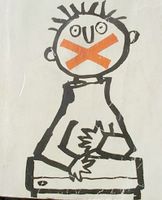
Ask me- I have a few ideas!.

Who should tell a schools story? Who knows best about what happens in the classrooms? Who is best to judge the quality and effectiveness of teaching?
These are the questions were part of a school evaluation project asked by a recent UK Department of Education and Science in one of their reports.
For the last decade or so the only voices that have been heard are those of the technocrats of the various Ministries of education as they have imposed their so called ‘efficient' measurable curriculums – this is certainly the case in New Zealand. Students in the process have been turned into consumers and teachers asked to ‘deliver’ the curriculum!
More recently the vital role of each individual teacher has been ‘rediscovered’ but, as yet, teacher’s voices have not really been listened to.
Teachers have important stories to tell and their valuable professional judgments need to be recognized but, too often, teachers remain isolated from each other, ‘privatized’ in their own classrooms. If teachers were to share their personal narratives valuable insights would be released into the system. This would require greater collaboration between teachers and the opening of their classrooms to the eyes of others. Interdisciplinary groups could ‘evolve’, through dialogue, shared teaching beliefs and in the process develop a common language to self reference their insights against and, as well, to contribute to school review.
Teacher aides and relievers can also provide valuable insights about the quality of teaching and learning as in their roles they act as ‘candid cameras’. Their ‘voices’ can be accessed by entering into dialogue with them to add their insights – their views are too valuable to ignore.
Parent’s voices are another source of knowledge but too often are restricted to surveys and questionnaires and in, too many situations, an uneasy distance between teachers and parents seem to be the norm. Many schools visit homes informally or set up focus groups – even a friendly ring from the class teachers has an amazing effect. When parents are involved their hopes and dream for their children match up with the view of teachers. Michael Fullan writes that when teachers, students and parents work in concert you have what he calls the ‘power of three – if one partner is ‘missing’ learning is difficult!
The BOT are a group who ought to have real input into the direction of the school and the quality of the teaching and learning but too often they are kept at a distance by the principal - and often BOT members are all to happy to leave the teaching and learning over to the principal. This ought not to the case and, if the school has developed a community vision for the school, they ought to have information given to then on the quality of teaching and learning. Teachers can be invited to attend BOT meeting to outline programmes and concerns and the BOT can met in different parts of the school All BOT members could also take turns to tour the school to see the school in action.
Possibly the people who know best about what happens in the classrooms are those who are closest to the action – the students themselves. Where teachers have a ‘bird’s eye view’ the students have a ‘worm’s eye view’. They see more of the hidden life of the classroom and are ‘unique experts in their own feelings, frustrations and triumphs.’
Too often they are the last to be consulted and remain an untapped source of knowledge. One writer calls them the ‘treasures in our own backyard’.’ A school that overlooks their intelligence is inevitably poorer as a consequence.’ Last to be consulted they are ‘closet to the heart beat of the school.’ They are the greatest source of potential energy and, when asked for their input, they give critical but honest and fair feedback. Teachers who appreciate student feedback have a greater confidence in involving students in planning curriculum tasks and in getting their suggestions for school improvements. It all depends on the quality of the relationship with the students the teacher has. Involving students is a risky business but one worth taking as students are in a position to challenge current assumptions about teaching and learning that teachers can easily overlook.
It is only when all involved in the school work together for the common good of all that all students can develop a real love of learning and leave with all the appropriate qualities in place to continue their life long journey as learners. Only when everyone involed energy is aligned towards reaching a shared vision and beliefs that a school can be called a true learning organization. Such a school is open to ideas from any source that might improve the quality of its teaching and learning.
The more 'voices' that are heard the better.
It is time for central technocrats to give their one-sided 'voices' a rest.
3 comments:
I think you make an important point. At centre the voice of students and their teachers seems sadly neglected.
And the 'voices' of the culturally different are invisable - the 'gifts' they offer are ignored and, often, the alien culture they are exposed to is destructive to their identities.
What you are saying is that everyone involved in the school has a leadership role once they have worked out the game they are playing?
Post a Comment